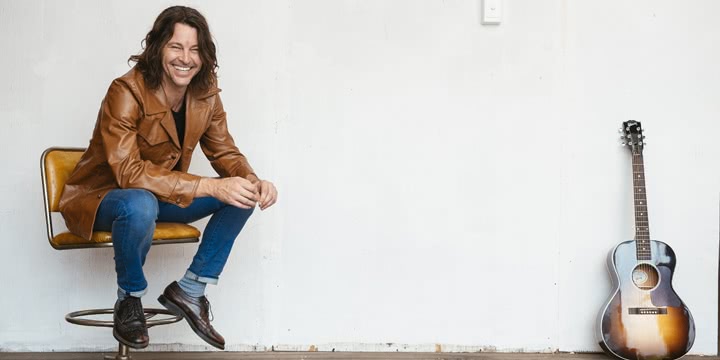Bernard Fanning has attained that rare distinction, succeeding as both a frontman and a solo artist.
Through Powderfinger he became a household name, and has continued to accrue fans and impress critics as a performer in his own right. Yet the man himself remains relatively unknown, a secrecy in part born from the classic sense of discomfort many performers feel. But when discussing his latest album, Civil Dusk,Fanning opens up, revealing that he considers a song first and foremost a way for singers to communicate directly with their audiences.
“I think there’s often this misnomer that happens with writing, and art in general,” he suggests, “that it has to be this expression of yourself. To a certain extent that’s true, but you also are free to invent and add whatever you like: to create what you want. It’s about going into it with the idea of creating something for yourself that hopefully resonates with other people. Because, if it isn’t moving you in the first place, it has very little chance of moving anybody else. It’s really most importantly about communicating ideas, and it doesn’t matter what the genre of music is if you mean it. It doesn’t matter if that’s in the confines of a romantic song, or a political song about a rabbit. You just have to mean it.”
Rabbits notwithstanding, the political potential of songwriting is something Fanning is quite well-versed in. Civil Dusk’s lengthy closer is ‘Belly Of The Beast’, a song born from Fanning’s great frustration about indigenous and refugee rights within Australia. Indeed, Civil Dusk is in general a more mature album from the musician, full of songs from a man unafraid to paint with a darker brush.
“My wife is Spanish, so we have flit back and forth over the last few years. But [I’m] still paying close attention to what is happening in Australia, where’s there’s a lot of turmoil. There’s been a lot of political turmoil since Howard basically.
“Then there’s all of the Rudd-Gillard-Abbot fiasco, something which continues to this day. [‘Belly Of The Beast’] is talking about the idea that, regardless of what we think our politicians are doing to represent us, it’s incumbent on us the voters to make sure the right people are selected in the first place.
“Granted, the people elected aren’t given license to be maniacs and to do ridiculous things, to apply policies like the asylum seeker policy or the complete lack of activity when it comes to Aboriginal Australia. Those sorts of things show a major immaturity and weakness in the way that we approach politics in Australia: it shows that short-termism. Looking at both of those issues in particular, they are issues that will take a generation to solve, to work at and make large improvements. And that’s the kind of people that we have to look to elect. The people who are looking at the long-term, not just looking for immediate popularity.”
Oddly enough, one of the most immediately exciting aspects of Civil Dusk isn’t even the music itself, but the fact that it represents one side of a coin: a complimentary album, Brutal Dawn, is fast on its heels, and is likely to carry over certain influences and reflections of its predecessor. Given some commentators have already identified Civil as a relatively melancholic album, it will be fascinating to see just how closely aligned the two records are. Or maybe it’s just that Fanning needs a hug.
“Ha! No, no, I’m good. I intend to write [Brutal Dawn] until the last possible day that I can still be writing and recording. I want to make the best kind of record that I can. So at the moment there are some crossovers there. If those songs end up being the best ten of the next collection, then yeah, they’ll go on. But most important is putting out the songs that can do the job.
“But you know, I don’t want to be held to that idea of tying them together. If they sound completely different, that’s OK, as long as there are some connections there. We’re recording in the same place, and I’m still going to be playing the majority of it, so there are already some limitations right there,” he laughs. “But we don’t intend it to just be a bunch of songs that didn’t make it onto Civil Dusk. I want to make it better than Civil Dusk.”
Some 20 years ago, Fanning admitted to feelings of uncertainty about finding his musical feet, and he expressed concerns that his voice was failing. These decades later, he is clearly a man who has made peace with the nature of his talent.
“Ultimately, the thing I enjoy the most is songwriting,” he says. “The puzzle, that’s the thing that’s important, whether or not it’s my voice communicating it. There’s always going to be much better voices out there. Bob Dylan is a good example. That guy did not have a classically likeably voice, but he’s one of the best communicators of ideas. And that’s what matters in the end.
“How do you tell an idea? I think it goes back to whether I need a hug or not. If I’ve been able to communicate enough that there’s this sadness there attached to the song, then that’s great. That’s what you want.”
[Bernard Fanning photo by Cybele Malinowski]
Bernard Fanning performs at theState Theatre Saturday October 22 and Sunday October 23, for more on Civil Dusk head to bernardfanning.com.

































